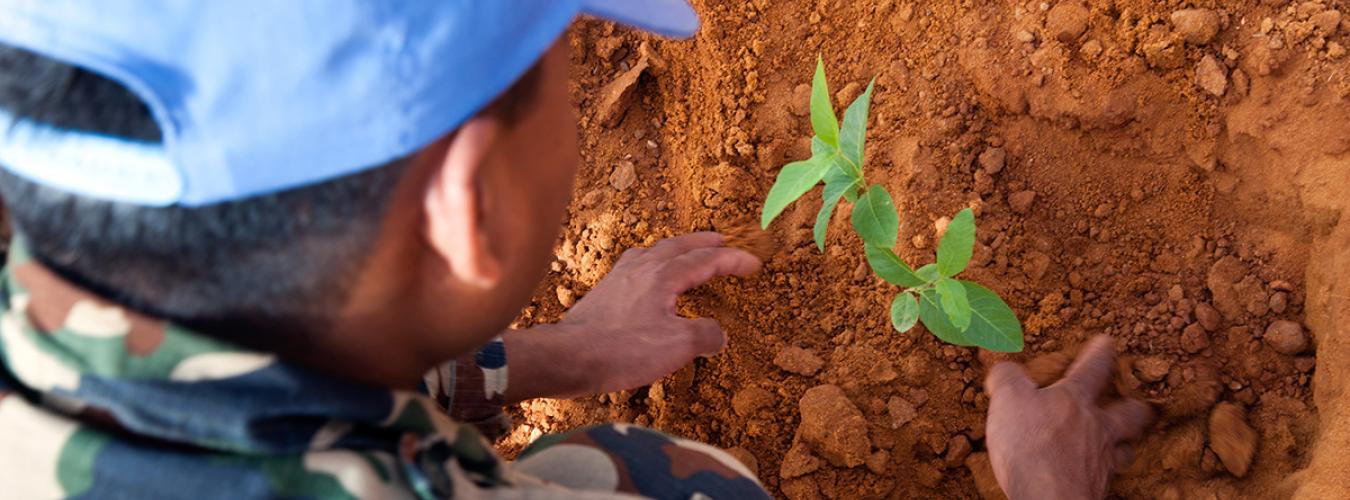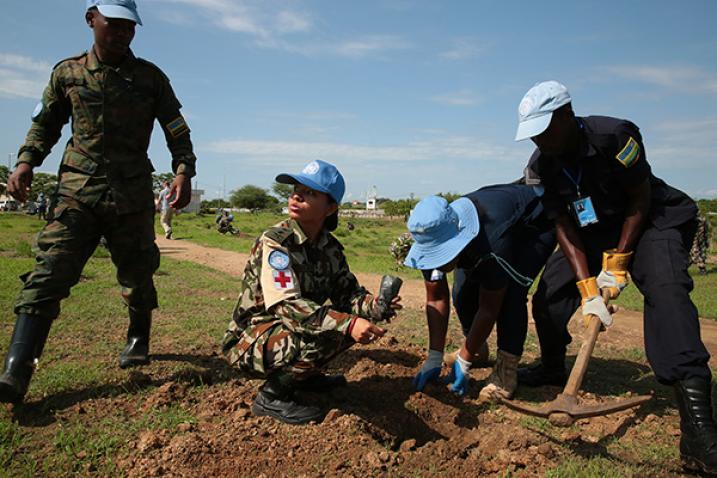Though humanity has always counted its war casualties in terms of dead and wounded soldiers and civilians, destroyed cities and livelihoods, the environment has often remained the unpublicized victim of war. Water wells have been polluted, crops torched, forests cut down, soils poisoned, and animals killed to gain military advantage.
Furthermore, the United Nations Environment Programme (UNEP) has found that over the last 60 years, at least 40 percent of all internal conflicts have been linked to the exploitation of natural resources, whether high-value resources such as timber, diamonds, gold and oil, or scarce resources such as fertile land and water. Conflicts involving natural resources have also been found to be twice as likely to relapse.
The United Nations attaches great importance to ensuring that action on the environment is part of conflict prevention, peacekeeping and peacebuilding strategies, because there can be no durable peace if the natural resources that sustain livelihoods and ecosystems are destroyed.
On 5 November 2001, the UN General Assembly declared 6 November of each year as the International Day for Preventing the Exploitation of the Environment in War and Armed Conflict (A/RES/56/4).
On 27 May 2016, the United Nations Environment Assembly adopted resolution UNEP/EA.2/Res.15, which recognized the role of healthy ecosystems and sustainably managed resources in reducing the risk of armed conflict, and reaffirmed its strong commitment to the full implementation of the Sustainable Development Goals listed in General Assembly resolution 70/1, entitled “Transforming our world: the 2030 Agenda for Sustainable Development”.
Partnerships
EU-UN Partnership on Land and Natural Resource Conflicts
Six United Nations agencies and departments (UNEP, UNDP, UNHABITAT, PBSO, DPA and DESA), coordinated by the UN Framework Team for Preventive Action, have partnered with the European Union (EU) to help countries identify, prevent and transform tensions over natural resource as part of conflict prevention and peacebuilding programmes.
Global Research Programme on Post-Conflict Peacebuilding and Natural Resources
The Environmental Law Institute (ELI), United Nations Environment Programme (UNEP), and the Universities of Tokyo and McGill initiated a global research programme to collect lessons learned and good practices on managing natural resources during post-conflict peacebuilding. This four-year research project has yielded more than 150 peer-reviewed case studies by over 230 scholars, practitioners and decision-makers from 55 countries. This represents the most significant collection to date of experiences, analyses and lessons in managing natural resources to support post-conflict peacebuilding.
UN Partnership on Women and Natural Resources in Peacebuilding Settings
The United Nations Environment Programme (UNEP), the United Nations Entity for Gender Equity and the Empowerment of Women (UN Women), the United Nations Development Programme (UNDP) and the United Nations Peacebuilding Support Office (PBSO) have established a partnership to collaborate on improving the understanding of the complex relationship between women and natural resources in conflict-affected settings, and make the case for pursuing gender equality, women’s empowerment and sustainable natural resource management together in support of peacebuilding. The first outcome of the collaboration is a joint policy report released on 6 November 2013.
If we are to achieve the SDGs, we need to act boldly and urgently to reduce the risks that environmental degradation and climate change present for conflict and commit to protecting our planet from the debilitating effects of war.
António Guterres
Event
Side-event "Environmental Security in War and Armed Conflict"
Yearly on November 6, the world observes the International Day for Preventing the Exploitation of the Environment in War and Armed Conflict. This day serves as a reminder of the devastating impact that war and conflict can have on our environment.
Resources
Documents
- Resolution A/RES/56/4 declaring the Day
- Protection of the environment in areas affected by armed conflict (UNEP/EA.2/Res.15)
- UN Resolution on Environmental Sustainability in Mali Peacekeeping Operations [S/RES/2100 (2013)]
- Environment and Security: a Global Agenda for UNEP [UNEP/GC.23/INF/21]
- Publications on Environmental Peacebuilding
- Policy Briefs
Policy Reports
- Women and Natural Resources: Unlocking the Peacebuilding Potential
- Greening the Blue Helmets
- Protecting the Environment During Armed Conflict: An Inventory and Analysis of International Law
- From Conflict to Peacebuilding: The Role of Natural Resources and the Environment
Guidance Notes
- Natural resource management in transition settings – UNDG/ ECHA Guidance Note
- The EU-UN partnership on Land and Natural Resource Conflicts
UN System
- UNEP Disasters and Conflicts Programme
- UNEP Disasters and Conflicts Programme (brochure)
- UNEP Environmental Cooperation for Peacebuilding Programme
- Environmental Emergencies Centre
- UN Development Programme (UNDP)
- UNDP Crisis Prevention & Recovery
- UN Entity for Gender Equality and the Empowerment of Women (UN Women)
- UN International Law Commission: Protection of the environment in relation to armed conflicts





